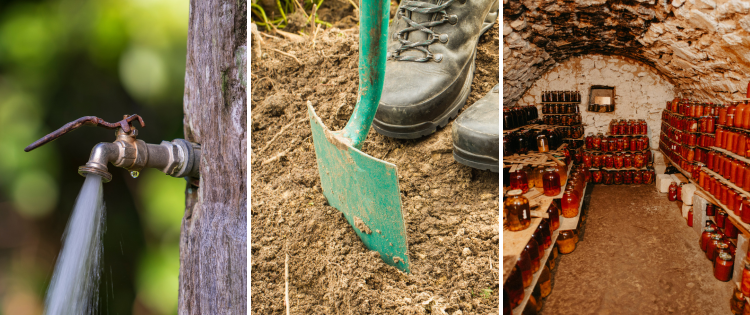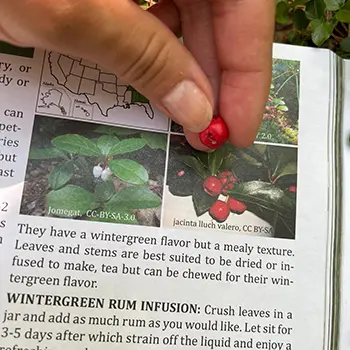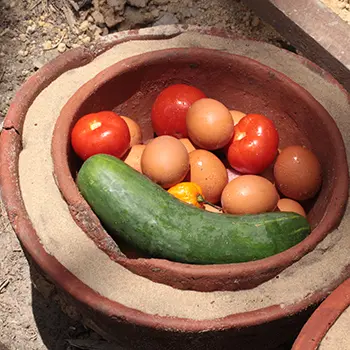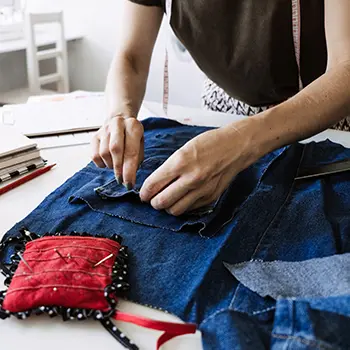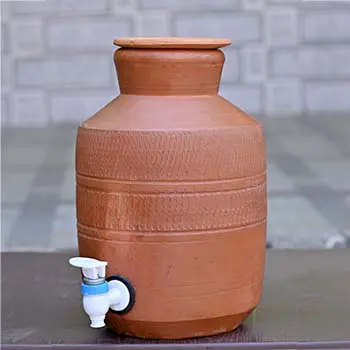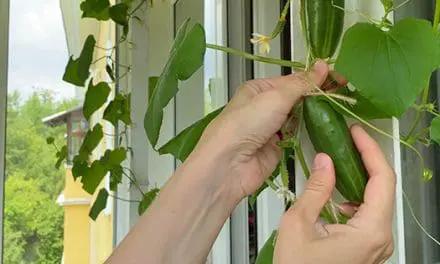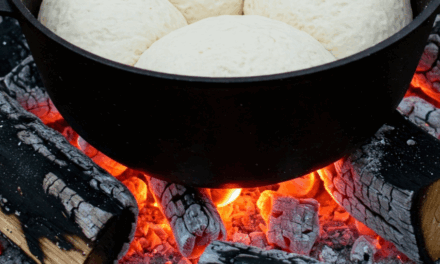You probably know how to grow food or raise chickens. Yes? But are those skills enough to help you outlive a crisis? No. Let me walk you through some of the most important skills to outlive a crisis.
When supermarkets shut down and power cuts, your survival won’t hinge on those. And let’s face it. We’ve all seen the world we live in right now.
Instead, it’ll depend on these 9 skills that most homesteaders overlook:
9 Skills Every Homesteader Must Have To Outlive A Crisis
Scouting for Hidden Water Sources 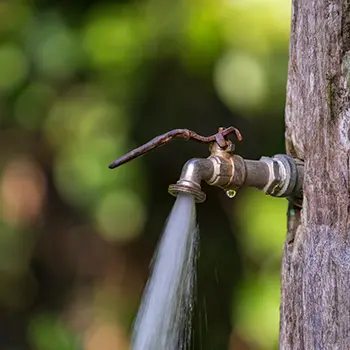
When your well runs dry or tap water stops flowing, knowing how to spot and harvest hidden water could save your life. Forget waiting for rain—dew collection is a silent hero.
Spread plastic sheeting overnight over grass or slopes, and by dawn, gravity pools water into containers. I’ve wrung two gallons from dew alone during a month-long drought.
But if trees dominate your land, tap them. Birch and maple sap aren’t just for syrup—they’re 50% water. Drill a shallow hole into the trunk, insert a spile (a carved stick works), and let gravity fill your bottle. One birch can yield a quart daily.
For long-term solutions, hunt for underground springs. Look for clusters of water-loving plants like cattails or willows. Dig a test pit with a shovel or post-hole digger—if damp soil appears, keep going until water seeps in. Line the hole with rocks to prevent collapse, and you’ve got a basic well. I’ve used this method to source 5 gallons a day during dry spells.
But what if digging a well isn’t an option? The Amish came up with a DIY device that pulls water straight from the air—no electricity needed.
When there isn’t any running water, you won’t be able to go and dig yourself a well in a hurry. But you can make this no-electricity device that will provide drinking water from the atmosphere for you and your family.
First Aid and Emergency Medical Skills
A basic first aid kit won’t cut it when hospitals are unreachable. Mastering skills to outlive a crisis means knowing how to treat wounds and illnesses with what’s on hand. For infections, skip store-bought ointments. Mash fresh plantain leaves into a poultice; their aucubin compound kills staph bacteria. During a flu outbreak, brew yarrow tea (steep 1 oz dried flowers in hot water) to reduce fevers by 2°F within hours.
Dehydration and hypothermia are silent killers. Mix 6 tsp sugar and 1 tsp salt into a quart of water for oral rehydration—it’s 3x more effective than plain water.
To treat hypothermia, strip wet clothes, layer dry wool blankets, and place hot stones (wrapped in cloth) at pulse points. Make sure to stockpile 00-gauge suture thread and lidocaine powder (for numbing) in your kit—they’re lightweight and last decades.
But knowing a few remedies isn’t enough. What happens when a serious injury or illness strikes, and there’s no doctor around? When hospitals are overrun and medications become impossible to source, what will you do? Relying solely on an already-stressed healthcare system isn’t an option during a true emergency.
That’s why I started learning how to manage common health issues and emergencies at home. I found invaluable advice here on treating injuries, illnesses, and chronic conditions when professional help isn’t an option. Plus, I learned that there is an easy, ingenious, and safe way to stockpile antibiotics without a prescription. It’s a resource every homesteader should have in their arsenal.
Skills to Outlive a Crisis: Foraging 
Foraging is one of those skills to outlive a crisis that every homesteader should have in their back pocket. When times get tough, your garden might not always produce enough, and store shelves could be empty. Knowing how to identify wild plants, berries, nuts, and mushrooms can mean the difference between going hungry and having a meal. Plus, nature provides plenty of medicinal plants that can help with everything from colds to infections.
I’ve relied on foraging more times than I can count—whether it was grabbing wild greens for a salad or finding berries to turn into jam. And let’s be honest, it’s also just smart. Why let free food go to waste? Of course, you need to learn what’s safe and what’s not because some plants can be deadly. But once you get the hang of it, foraging adds another layer of security to your homestead life. You never know when you’ll need it.
You can look up foraging in your area online, but let’s be honest—it’s tough to find good, reliable information. Plus, guessing with wild plants can be dangerous. If you want to outlast any crisis and find free food like a pro, this is the best foraging guide out there. You can find free food regardless of the season.
I’ve got plenty of foraging books at home, but none break things down like this one. It covers over 400 plants with big, full-color pictures, making identification easy. Whether you’re a beginner or experienced, this guide takes the guesswork out of foraging.
Soap-Making for Hygiene and Trade
Clean hands are your armor against disease so you’ll need soap to constantly wash your hands. Mastering skills to outlive a crisis means being able to create essentials from scratch. To make your own, start with ashes. Hardwood ash (oak or maple) mixed with rainwater creates lye. Strain 5 cups of ash through the cloth into a bucket, then boil it down until an egg floats in the liquid—that’s your lye.
Melt 2 pounds of rendered animal fat (deer tallow works best) in a cast-iron pot. Slowly pour in the lye, stirring with a wooden spoon until it thickens like pudding. Pour into molds—I’ve used hollowed-out logs—and cure for 4 weeks.
For medicinal soap, add dried thyme or lavender to the mix. Thyme’s thymol kills bacteria; I’ve treated infected cuts with it. Avoid using aluminum pots—they react with lye and poison the batch. Test a sliver of soap on your tongue; if it stings, rinse the batch and tweak the lye ratio.
Skills to Outlive a Crisis: Natural Refrigeration Without Electricity 
Perishables spoil fast without power, but you don’t need a freezer to keep carrots crisp or milk safe. Heck, my Zeer pot keeps tomatoes fresh for 18 days plus. Learning skills to outlive a crisis means knowing off-grid food preservation.
To build one, nest two unglazed clay pots (one smaller than the other) with a 2-inch gap between them. Fill the gap with sand, pour water into the sand until saturated, then cover the top with a damp cloth. Evaporation cools the inner pot to 40°F—cold enough to slow rot.
Root cellars are simpler but demand location savvy. Dig a 6-foot-deep pit in dense soil (avoid sandy ground), line it with stones or wood, and add vents for airflow. Store root veggies in crates layered with straw to prevent frost contact. My cellar holds potatoes for 8 months at 55°F.
Here’s something you should try out that I learned from YouTube: Bury a sealed metal trash can halfway in shaded soil for a makeshift fridge—it’ll hover around 50°F year-round.
But if you’re looking for a more reliable, time-tested way to keep food cold without power, take a lesson from the Amish.
The Amish found a way to make a fridge that needs no electricity. Many Amish recipes are already long-lasting without refrigeration. But there are some foods that would spoil in no time were it not for their Amish fridge.
In a blackout—especially a long-term one—this one Amish invention may end up saving more lives than any other. So, I hope you’ll add one to your own home while there is still time.
Building a Rocket Stove for Efficient Cooking
A rocket stove isn’t just a campfire upgrade—it’s a survival multiplier. When firewood runs scarce, this compact design burns 70% less fuel than an open flame while generating intense heat. I’ve boiled 2 gallons of water in 15 minutes using one I built from salvaged cinder blocks during a nor’easter.
Mastering the skills to outlive a crisis means knowing how to cook and stay warm with minimal resources. Start by stacking firebricks or cinder blocks into a J-shaped combustion chamber. The vertical “chimney” forces airflow, creating a roaring draft that incinerates even damp twigs. Line the interior with refractory cement or clay to handle 1,200°F temps. For a portable version, weld two metal cans (a large coffee tin inside a gallon paint can) and pack the gap with perlite insulation.
Fuel goes into the horizontal feed tube. Stick to wrist-thick branches. The vertical chamber’s thermal efficiency directs heat straight to your pot, minimizing waste. Use it to bake flatbreads on a griddle, sterilize tools with boiling water, or heat a small room.
Skills to Outlive a Crisis: Repairing Clothing and Footwear for Longevity 
A split boot sole or torn jacket isn’t a death sentence if you’ve mastered basic cobbling. Here’s how I revive work boots using a scrap of truck tire rubber:
Cut the rubber to size, punch holes with a nail, and lace it to the sole with braided paracord or sinew. For waterproofing, melt beeswax into the seams—this fix lasts six months of daily use.
Hand-sewing demands more than a needle and thread. Use a saddle stitch (two needles working opposite directions) for unbreakable seams on heavy fabrics like denim or canvas. Finish up by rubbing pine resin on leather patches to bond them instantly to worn shoe uppers without stitching.
Emergency Signal Making and Communications
When your homestead is cut off, a simple signal could mean rescue. During wildfire evacuations like those in California, you can use a smoke pattern to alert a passing helicopter.
To make one for yourself, build a signal fire with three small, spaced-out pyres. Add green pine boughs or rubber strips to create thick, black smoke visible for 12+ miles. Knowing the skills to outlive a crisis can be the difference between life and death. Light only when you hear aircraft.
Conserving fuel is key.
For ground-to-ground signaling, polish the bottom of a tin can into a makeshift mirror. Sunlight reflections can flash Morse code (e.g., three quick flashes = SOS) up to 10 miles in clear weather. Practice the alphabet daily—it takes 20 hours to memorize the basics.
For isolated properties, rig a field phone: string copper wire between two tin-can “receivers” stretched taut over 300 yards. Pair it with a hand-crank radio (pre-tuned to NOAA frequencies) to monitor emergencies without grid power.
Skills to Outlive a Crisis: Advanced Water Purification Techniques 
Boiling water works, but fuel shortages demand smarter methods. Developing skills to outlive a crisis means having reliable water purification. During a 3-week flood that contaminated my well, I filtered 10 gallons daily using a layered system: gravel (removes debris), sand (traces parasites), and hardwood charcoal (neutralizes toxins like pesticides).
Crush charcoal into pea-sized chunks—too fine, and it clogs; too coarse, and it’s ineffective.
For droughts, build a solar still. Dig a 3-foot-wide hole, place a clean container in the center, and cover it with plastic sheeting weighted by a rock.
Sunlight evaporates ground moisture, which condenses on the plastic and drips into the container. In arid climates, I’ve harvested a quart daily using this method.
Long-term storage requires more than barrels. Add 8 drops of unscented bleach per gallon, seal in UV-resistant containers, and rotate every 6 months. For large-scale needs, bury a food-grade IBC tote wrapped in burlap—the soil’s thermal mass keeps water at 50°F, inhibiting algae.
Why These Skills Matter More Than Ever
Crises don’t discriminate. California’s wildfires forced evacuations, COVID-19 strained global supply chains, and Venezuela’s hyperinflation sparked blackouts. Nonetheless, with the right skills to outlive a crisis, you can make it through.
So which skill are you going to learn first?
Power Outage: How To Survive The First 7 Days
How The Amish Grow Potatoes in Thin Air (Video)
Dutch Oven Recipes Cowboys Survived On
High-Risk Looter Places You Have To Stay Away From In A Crisis
15 Things You Should Teach Your Children That Can Save Their Lives

